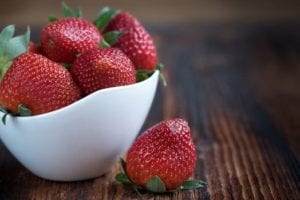Written by Taylor Woosley, Staff Writer. 12-week consumption of a strawberry powder containing 36.8 mg anthocyanins resulted in a reduction of interference in verbal learning and memory (p=0.02) and significantly improved depressive symptoms (p=0.04) compared to placebo.
 The population over the age of 60 is growing at a faster rate than other age groups, with the global life expectancy expected to reach 77.1 years by 20501. With aging, there is an increase in neurodegenerative diseases through an increase in cellular senescence of neurons and microglia, and an increase in mitochondrial dysfunction with increased oxidative damage and accumulation of DNA damage2. Inflammation is strongly implicated in the pathogenesis of neurodegenerative disorders, such as Alzheimer’s, with microglial macrophages in the brain becoming chronically activated during aging and promoting sustained production of pro-inflammatory cytokines3.
The population over the age of 60 is growing at a faster rate than other age groups, with the global life expectancy expected to reach 77.1 years by 20501. With aging, there is an increase in neurodegenerative diseases through an increase in cellular senescence of neurons and microglia, and an increase in mitochondrial dysfunction with increased oxidative damage and accumulation of DNA damage2. Inflammation is strongly implicated in the pathogenesis of neurodegenerative disorders, such as Alzheimer’s, with microglial macrophages in the brain becoming chronically activated during aging and promoting sustained production of pro-inflammatory cytokines3.
Berries, such as strawberries, contain a wide diversity of nonessential biologically active components, such as organic acids, flavonoids, and their subclass anthocyanins, which are believed to activate cellular antioxidant protection, inhibit inflammatory gene expression, and scavenge free radicals4. Dietary intervention with strawberries has been associated with improved cognition, specifically working memory, and enhanced motor performance5. Furthermore, it has been researched to reduce the level of reactive oxygen species and decrease the mRNA expression of interleukin-6 (IL-6) and tumor necrosis factor-α (TNF-α) in mouse models6.
Krikorian et al. conducted a randomized, double-blind, placebo-controlled study to analyze the efficacy of strawberry supplementation on neurocognitive function when instituted in the midlife preclinical period as an initial investigation of early intervention for dementia risk mitigation. Subject inclusion consisted of overweight (BMI=25 or greater) men and women aged 50 to 65 years old, who were experiencing mild cognitive decline. Participants were informed to refrain from all berry fruit consumption and products at least two weeks prior to study enrollment and to collect a three-day diet record the week prior to enrollment and the week prior to the final study visit.
30 subjects were assigned to either the strawberry powder group (n=15) or placebo (n=15) and were instructed to mix one packet of assigned powder into water to consume with the first meal of the day for 12 weeks. Each serving of the strawberry powder contained 36.8 mg anthocyanins derived from about 1 cup of whole fresh strawberries. The placebo powder was similar in color and appearance. Primary study outcomes were cognitive measures including The Porteus Maze Test (PMT), the Trail-Making Test, Controlled Oral Word Production, The California Verbal Learning Test (CVLT), and The Spatial Paired Associate Learning Test (SPAL). Additionally, primary outcomes were mood measures including The Beck Depression Inventory-II. Fasted blood samples were obtained to measure glucose, insulin, glycated hemoglobin, HOMA2-IR, triglycerides (TG), and high-density lipoprotein cholesterol (HDL-C).
No pre-intervention differences were noted regarding age, education, and general memory performance data between groups. Furthermore, no significant pre-intervention differences were observed for anthropometric and metabolic measures, besides the strawberry supplementation group exhibiting a lower mean fasting glucose value compared to placebo (p = 0.02). Significant findings of the study are as follows:
- The strawberry supplementation group experienced a significant reduction of interference in verbal learning and memory (p=0.02) compared to placebo.
- A lower mood disturbance was observed in the strawberry supplementation group compared to placebo (p=0.04).
- No significant effects were noted at the end of the intervention in the strawberry group regarding fasting glucose (p=0.61), fasting insulin (p=0.29), HOMA2-IR (p=0.45), glycated hemoglobin (p=0.67) or the TG/HDL ratio (p=0.85, p=0.43).
Results of the study show that 12-week strawberry administration significantly improved verbal learning, memory and reduced depressive symptoms in overweight adults experiencing mild cognitive decline. Further research should continue to explore the neuroprotective effects of strawberry consumption. Study limitations include the small sample size and length of trial.
Source: Krikorian, Robert, Marcelle D. Shidler, and Suzanne S. Summer. “Early Intervention in Cognitive Aging with Strawberry Supplementation.” Nutrients 15, no. 20 (2023): 4431.
© 2023 by the authors. Licensee MDPI, Basel, Switzerland. This article is an open access article distributed under the terms and conditions of the Creative Commons Attribution (CC BY) license (https://creativecommons.org/licenses/by/4.0/).
Click here to read the full text study.
Posted January 18, 2024.
Taylor Woosley studied biology at Purdue University before becoming a 2016 graduate of Columbia College Chicago with a major in Writing. She currently resides in Glen Ellyn, IL.
References:
- Krivanek TJ, Gale SA, McFeeley BM, Nicastri CM, Daffner KR. Promoting Successful Cognitive Aging: A Ten-Year Update. Journal of Alzheimer’s disease : JAD. 2021;81(3):871-920. doi:10.3233/jad-201462
- Gómez-Gómez ME, Zapico SC. Frailty, Cognitive Decline, Neurodegenerative Diseases and Nutrition Interventions. Int J Mol Sci. Jun 11 2019;20(11)doi:10.3390/ijms20112842
- McGrattan AM, McGuinness B, McKinley MC, et al. Diet and Inflammation in Cognitive Ageing and Alzheimer’s Disease. Curr Nutr Rep. Jun 2019;8(2):53-65. doi:10.1007/s13668-019-0271-4
- Miller K, Feucht W, Schmid M. Bioactive Compounds of Strawberry and Blueberry and Their Potential Health Effects Based on Human Intervention Studies: A Brief Overview. Nutrients. Jul 2 2019;11(7)doi:10.3390/nu11071510
- Rutledge GA, Fisher DR, Miller MG, Kelly ME, Bielinski DF, Shukitt-Hale B. The effects of blueberry and strawberry serum metabolites on age-related oxidative and inflammatory signaling in vitro. Food Funct. Dec 11 2019;10(12):7707-7713. doi:10.1039/c9fo01913h
- Zhang L, Ma Q, Zhou Y. Strawberry Leaf Extract Treatment Alleviates Cognitive Impairment by Activating Nrf2/HO-1 Signaling in Rats With Streptozotocin-Induced Diabetes. Front Aging Neurosci. 2020;12:201. doi:10.3389/fnagi.2020.00201
